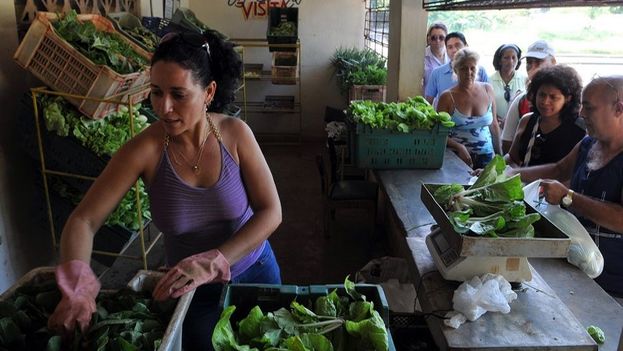
![]() 14ymedio, Madrid, 30 January 2023 — Just 23.3% of the members of the 4,096 micro, small and medium-sized enterprises (MSMEs) approved by the Cuban Government at the end of June 2022 were women. The data, offered this Sunday by Cubadebate, dedicated to analyzing the gender gap, joins other data that show that women are far from occupying the role that the official press attributes to them every March 8, when it boasts of the predominant place they have reached “thanks to the Revolution.”
14ymedio, Madrid, 30 January 2023 — Just 23.3% of the members of the 4,096 micro, small and medium-sized enterprises (MSMEs) approved by the Cuban Government at the end of June 2022 were women. The data, offered this Sunday by Cubadebate, dedicated to analyzing the gender gap, joins other data that show that women are far from occupying the role that the official press attributes to them every March 8, when it boasts of the predominant place they have reached “thanks to the Revolution.”
A report by the consulting firm Auge has analyzed 100 MSMEs they advised and of the 178 partners of those businesses, 66% are men and 34% are women. The study warns of another inequality, the predominant profile is that of men aged 30 to 55 years old and they are also the ones who have the most stakes in companies with more than one partner.
Other official data, although in this case from five years ago, are those released by the National Bureau of Statistics and Information (Onei), which placed the gender gap at 27%. The rate of male economic activity in 2018 was 76.9%, while the female rate barely reached 49.5%, with less employment in rural areas.
The official newspaper also notes in this article the miserable monthly salary of the state sector in that year, which was 777 pesos (32 dollars with the exchange rate current for that date).
Ileana Díaz, a professor at the University of Havana and coordinator of her Entrepreneurship Network, tells Cubadebate that the situation with regard to companies only conveys to the sector what was already happening in self-employment, a precursor of private business on the Island. Some 30% of those who worked on their own were women and most — she indicates without specifying the figure — did so as employees of the business owner and not as owners.
“They have less accumulated capital than men; not only financial, but also social, relational, which prevents them from moving more easily in the business and business world,” emphasizes the economist.
Few women have the 100,000 pesos on average that new businesses declare according to Auge data, says the article, attributing that lack to the fact that it is more common for men to own properties, such as cars or houses, whose sale can provide them with that initial capital.
The note shows the recognition that the public sector has been a factor of increase in the gender gap in Cuba, since it considers that women have less “relational capital” because they have worked more for the state “and almost always as officials or specialists and not in a management or decision-making position.”
They also attribute it to the widespread assumption of household chores and family care, something that the Revolution allegedly also aspired to leave behind. “Cuban society is better prepared than others to implement affirmative actions that favor access to economic spaces without discrimination, since the equality of people is a generalized value and verified in the laws,” says the Cubadebate article, which also starts by resorting to the embargo as an excuse.
The worsening of the island’s economic situation, which they attribute to the increase in US sanctions and the pandemic – which in turn have caused tourism to plunge “and put various stumbling blocks into the process of economic order” — worsens even more an already worse situation for women in employment, says the article.
“The tense economic situations of recent decades have made family daily life very challenging and overloaded, above all, for women,” says the article, which calls for thinking with a gender perspective when addressing “economic transformations.”
Although the gender gap is a feature common to all countries, with greater or lesser intensity, the recognition clashes with the traditional discourse of the regime, which it affirmed last March 8th in an article for Women’s Day. “It would be enough to look around us today to see in important political and state positions, of the economy, health, science and technology, education, diplomacy, parliament, sport, mass organizations, defense and security bodies, in everything, the special and often majority presence of women.”
The text also recalled the words of Fidel Castro, who had already stated in 1959. “When our Revolution is judged in future years, one of the issues for which we will be judged will be the way in which we have solved, in our society and in our homeland, the problems of women, even if it is one of the problems of the Revolution that require more tenacity, more firmness, more perseverance and effort.”
Translated by Regina Anavy
____________
COLLABORATE WITH OUR WORK: The 14ymedio team is committed to practicing serious journalism that reflects Cuba’s reality in all its depth. Thank you for joining us on this long journey. We invite you to continue supporting us by becoming a member of 14ymedio now. Together we can continue transforming journalism in Cuba.
